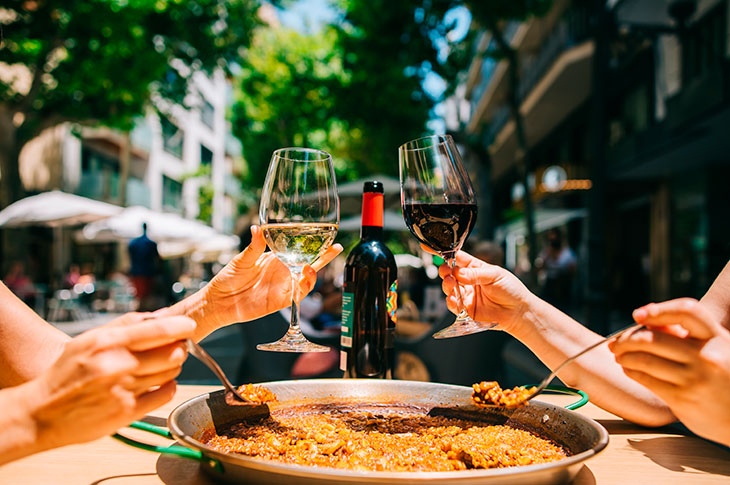Spain for foodies: cities that conquer with flavour
Six cities where tradition, innovation and flavour win over travellers
Spain is a top tourist destination thanks to its cultural richness, its history and its passion for good food. The variety and recognition of Spanish cuisine internationally has driven a growth in gastronomic tourism, attracting travellers from all over the world in search of authentic culinary experiences. Six cities stand out in this area, consolidating their position as benchmarks in the country’s gastronomic offer. Oviedo: This city, in the north of Spain, was awarded the title of Spanish Capital of Gastronomy in 2024. Its strategic location in Asturias facilitates gastronomic routes throughout the region. The culinary tradition of the destination stands out for its local and high-quality products, and among the most iconic dishes are fabada [bean stew], cachopo [veal stuffed with cheese and ham] and a wide variety of artisan cheeses. The cider culture and the traditional cider houses make it an essential place for cider lovers. Barcelona. The capital of the autonomous region of Catalonia is iconic for its modernist architecture, with the Sagrada Familia and Gaudí’s Park Güell; for its urban beaches; for its cultural offer and for its vibrant gastronomy. The consumption of products such as Mediterranean fish and seafood and dishes such as escalivada [smoky grilled vegetables], pa amb tomàquet [bread with tomato] butifarra [Catalan sausage] and suquet de peix fish stew] make the city a destination for foodies. It is also home to Michelin-starred restaurants and is a benchmark for culinary innovation. La Boquería market is a must for any visitor and wine tourism in nearby regions reinforces its appeal. Madrid: The Spanish capital is the birthplace of tapas and signature cuisine. In the city that never sleeps, gastronomy has become an attraction thanks to iconic dishes such as cocido madrileño [stew], callos [stew], bocadillo de calamares [squid sandwich] and churros con chocolate. The city is home to Michelin-starred restaurants, iconic markets such as San Miguel and San Antón and a vibrant tapas culture in neighbourhoods such as La Latina and Malasaña. Its offer includes international gastronomy and sensorial experiences that mix music, lights and flavours.

San Sebastián: If there is one region in Spain that stands out for its gastronomic excellence, it is the Basque Country, and the city of San Sebastian does so with its impressive concentration of Michelin-starred restaurants, such as Arzak, Akelarre and Martín Berasategui. The destination has the culture of little snacks, pintxo, and has iconic bars in the Old Town, offering unique small gourmet creations. It also has traditional markets such as La Bretxa, high-quality products and a strong fishing tradition. Malaga: The offer of seafood and local products has driven the gastronomic resurgence of the capital of the Costa del Sol. Its "pescaíto frito", "ajoblanco" [white Gazpacho], espetos de sardinas and "porra antequerana" [thick chilled soup], its sweet wines and its varied offer of tapas are the perfect complement to the relaxed and sunny atmosphere of the city. Malaga has iconic markets such as Atarazanas, a wine tradition with Certificate of Origin wines, and award-winning restaurants. Seville: The capital of Andalusia, on the banks of the River Guadalquivir, is a city steeped in history, art and gastronomy. From a good salmorejo [cold tomato soup] to spinach with chickpeas, the city offers a unique culinary experience. The taverns and tapas bars are the perfect place to sample authentic dishes in a lively and friendly atmosphere.

